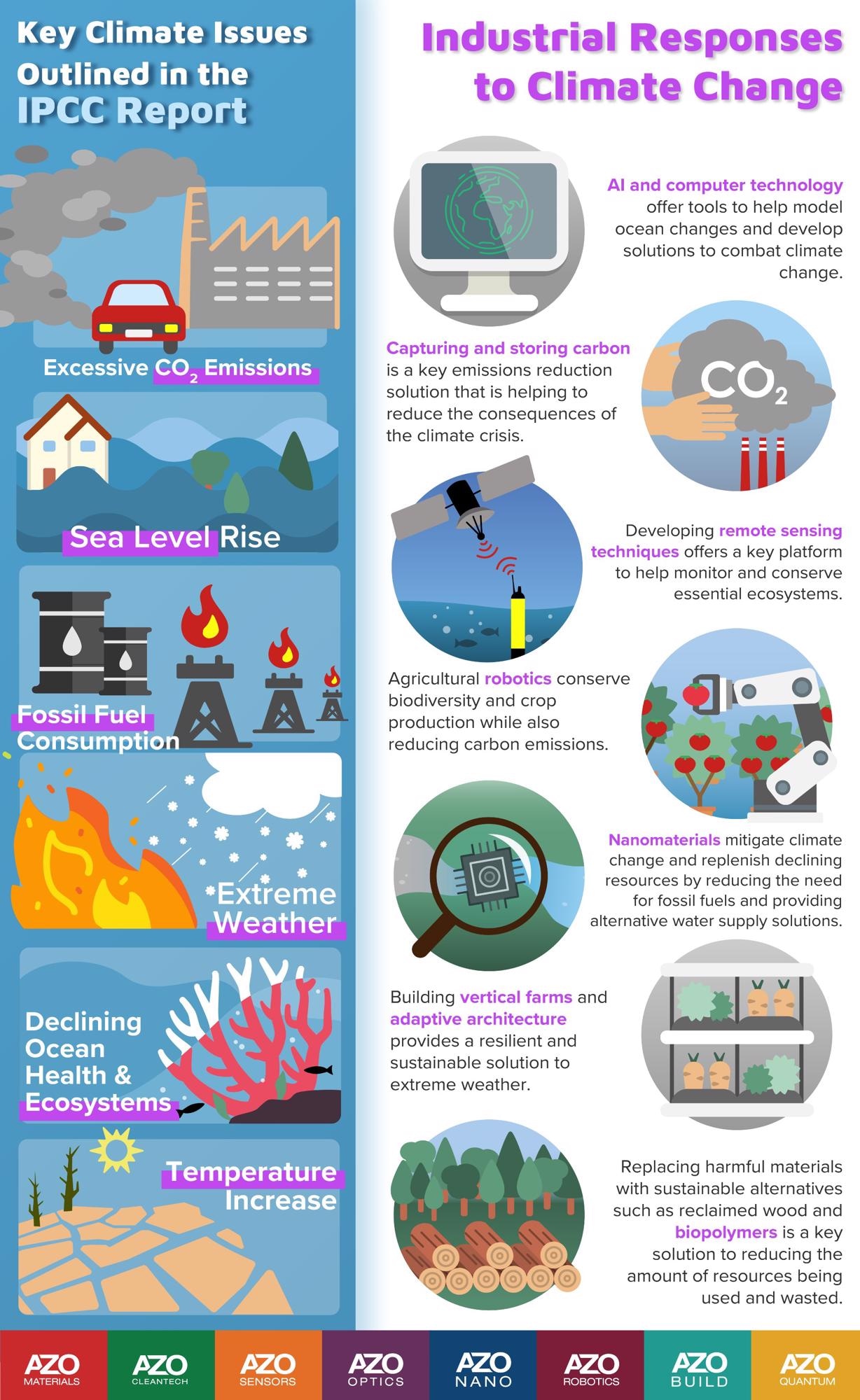
The impact of climate change factors on our planet is well-known. However, the importance of mitigating their effects and the solutions hoping to do so are not always acknowledged. The materials sector impacts almost every industry. Its involvement with climate change prevention is just beginning to be understood.
Released by the Intergovernmental Panel for Climate Change (IPCC), the 2018 Summary for Policymakers details stark warnings about the planet's current state, focusing on the already observed 1.50C global temperature increase. Still, no detail was spared on the consequences of such changes if significant mitigating action is not taken.
Along with the detailed consequences are the factors that trigger them; contributors such as increased atmospheric carbon dioxide (CO2) emissions received particular attention. The necessity of addressing such issues was also made abundantly clear by the IPCC: "Future climate-related risks would be reduced by the upscaling and acceleration of far-reaching, multilevel and cross-sectoral climate mitigation and by both incremental and transformational adaption."
What is IPCC's Sixth Assessment Report?
Video Credit: Intergovernmental Panel on Climate Change (IPCC)/YouTube.com
An update to this United Nations document followed in August 2021, titled the 2021 Physical Science Basis Summary for Policymakers. Taking a more in-depth look at the observed global changes and all future trajectories forms the IPCC's first comprehensive assessment of climate change scientific data since 2013. Here, the risk of rising sea levels, diminishing ecosystems, and vital resources such as clean water, along with the continued release of greenhouse gas emissions, are all discussed in detail. Throughout these investigations, the impact of human activities has also been made clear.
There is a near-linear relationship between cumulative anthropogenic CO2 emissions and the global warming they cause…Observed increases in well-mixed greenhouse gas (GHG) concentrations since around 1750 are unequivocally caused by human activities.
Climate Change 2021: Physical Science Basis Summary for Policymakers, IPCC, 2021
Anthropogenic actions are largely behind the devastating changes to the global climate and, as a result, the planet itself. To preserve the future of the environment, adaptive solutions from all industries are necessary. Otherwise, climate change mitigation cannot be achieved.
An Industrial Response to Climate Change
In this Editorial series, AZoMaterials is taking a sector-specific look at how the materials engineering industry and research field are tackling the prominent issues highlighted within the IPCC's 2018 Summary for Policymakers and 2021 Physical Science Basis reports.
Articles will explore a specific advancement or adaption in detail, discussing how each topic links to climate change mitigation strategies. Relevance to critical issues highlighted within the IPCC's recent reports is also included. This coverage through AZo's Industrial Response to Climate Change series gives the unique opportunity to spotlight innovative solutions within the materials industry, demonstrating the importance of research and development to combat this global crisis.

Image Credit: Sara Lopez Segura
AZoMaterials discusses how sustainable sources of heavily relied-upon materials such as glass and plastic are being made possible with developments in effective conversion of wood towards transparency. As the global population grows, replacing daily materials with an energy-efficient, easily recyclable alternative could help reduce industry-related emissions.
Extreme weather and temperature fluctuations are predicted to both continue and worsen for the majority of the population. Construction components that can cope with these changes while remaining cost-effective are rare; could phase change materials be the best solution?
Cement has wide-reaching involvement with various sectors, but the concentration of atmospheric CO2 gas associated with its production and use is catastrophic. Research into suitable alternatives for its utilization within soil improvement has uncovered the potential applications of biopolymers. In other areas, solutions aiming to cut cement-related carbon emissions have indicated the practicalities of carbonatable material in carbon mineralization processes.
Designing effective strategies to address some of the major climate change factors affecting the global climate is vital. Only through innovations in key industries such as the material sector can a significant change be made.
References and Further Reading
IPCC, (2018) Summary for Policymakers. In: Global Warming of 1.5°C. An IPCC Special Report on the impacts of global warming of 1.5°C above pre-industrial levels and related global greenhouse gas emission pathways, in the context of strengthening the global response to the threat of climate change, sustainable development, and efforts to eradicate poverty [Masson-Delmotte, V., P. Zhai, H.-O. Pörtner, D. Roberts, J. Skea, P.R. Shukla, A. Pirani, W. Moufouma-Okia, C. Péan, R. Pidcock, S. Connors, J.B.R. Matthews, Y. Chen, X. Zhou, M.I. Gomis, E. Lonnoy, T. Maycock, M. Tignor, and T. Waterfield (eds.)]. World Meteorological Organization, Geneva, Switzerland. In Press
IPCC, (2021) Summary for Policymakers. In: Climate Change 2021: The Physical Science Basis. Contribution of Working Group I to the Sixth Assessment Report of the Intergovernmental Panel on Climate Change [Masson-Delmotte, V., P. Zhai, A. Pirani, S. L. Connors, C. Péan, S. Berger, N. Caud, Y. Chen, L. Goldfarb, M. I. Gomis, M. Huang, K. Leitzell, E. Lonnoy, J.B.R. Matthews, T. K. Maycock, T. Waterfield, O. Yelekçi, R. Yu and B. Zhou (eds.)]. Cambridge University Press. In Press.